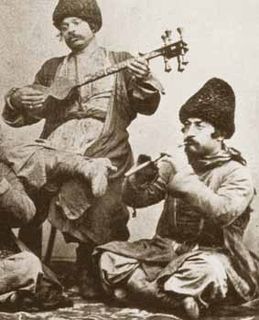
The Russo-Turkish War of 1828–1829 was sparked by the Greek War of Independence of 1821–1829. War broke out after the Ottoman Sultan Mahmud II closed the Dardanelles to Russian ships and revoked the 1826 Akkerman Convention in retaliation for Russian participation in October 1827 in the Battle of Navarino.

Akhaltsikhe is a small city in Georgia's southwestern region (mkhare) of Samtskhe–Javakheti. It is situated on the both banks of a small river Potskhovi, which separates the city to the old city in the north and new in the south.

Kars is a city in northeast Turkey and the capital of Kars Province. Its population is 73,836 as of 2011.

Samtskhe–Javakheti, is a region (mkhare) in southern Georgia which includes the historical Georgian provinces of Meskheti, Javakheti and Tori. Akhaltsikhe is its capital.

The Lom people, also known as Bosha by non-Loms or Armenian Romani or Caucasian Romani, are an ethnic group in historic Armenia. Their Lomavren language is a mixed language, combining Indo-Aryan and Armenian.

The First Republic of Armenia, officially known at the time of its existence as the Republic of Armenia, was the first modern Armenian state since the loss of Armenian statehood in the Middle Ages.

The Battle of Akhaltsikhe may refer to one of the following:

Ardahan is a city in northeastern Turkey, near the Georgian border. It is the capital of Ardahan Province.

The Provisional National Government of the Southwestern Caucasus, Provisional National Government of South West Caucasia or Kars Republic was a short-lived nominally-independent provisional government based in Kars, northeastern Turkey. Born in the wake of the Armistice of Mudros that ended World War I in the Middle East, it existed from December 1, 1918 until April 19, 1919, when it was abolished by British High Commissioner Admiral Somerset Arthur Gough-Calthorpe. Some historians consider it to have been a puppet state of the Ottoman Empire.

The Kars–Gyumri–Tbilisi railway line is a railway line that runs from the city of Kars in Turkey to the Armenian city of Gyumri, and from there on to Tbilisi, Georgia.

The Baku–Tbilisi–Kars (BTK), or Baku–Tbilisi–Akhalkalaki–Kars railway (BTAK), is a regional rail link project connecting Azerbaijan, Georgia and Turkey, which became operational on 30 October 2017 following several years of delays. The project was originally due to be completed by 2010, but was delayed to 2013, 2015, 2016, and, following a fifth trilateral meeting in February 2016, foreign ministers of the three countries announced that the railway would finally be completed in 2017.
Kars Oblast was one of the oblasts of the Caucasus Viceroyalty of the Russian Empire between 1878 and 1917. Its capital was the city of Kars, presently in the Republic of Turkey. The governorate bordered with the Ottoman Empire, Batum Oblast, Tiflis Governorate, Erivan Governorate, and from 1883 to 1903 the Kutais Governorate. It covered all of Turkey's present provinces of Kars and Ardahan and the northeastern part of Erzurum Province as well as a small part of Armenia.

European Route E 117 is part of the International E-road network, which is a series of main roads in Europe.

Armenians in Samtskhe–Javakheti are ethnic Armenians of Georgian nationality living in the Samtskhe–Javakheti region of the Republic of Georgia. The southern part of the region (Javakheti) borders Armenia to the south. Here, ethnic Armenians form the great majority of the population with minorities of Georgians, Russians and Caucasus Greeks. Among Armenians of Samtskhe–Javakheti, Armenian is the common language spoken.

E 001 is a European B class road in Georgia and Armenia, connecting the cities Marneuli - Sadakhlo - Bagratashen - Vanadzor

European route E 97 is an A-class European Route in Ukraine, Russia, Georgia, and Turkey. The highway runs for 1,360 kilometres (850 mi) in total. It connects the North Black Sea region with the South Black Sea region along the eastern shores of the sea.

he Georgian Orthodox Church is a major part of Orthodox Christianity in Turkey. Georgian churches in Turkey, namely in Artvin, Ardahan, Kars and Erzrum Province are under jurisdiction of Batumi and Lazeti, Akhaltsikhe and Tao-Klarjeti and Akhalkalaki, Kumurdo and Kars eparchies.

The Caucasus Greeks, sometimes known as the Greeks of Transcaucasia and Russian Asia Minor, are the historically Greek-speaking peoples of the North Caucasus and Transcaucasia in what is now southwestern Russia, Georgia, and northeastern Turkey. These specifically include the Pontic Greeks, though they today span a much wider region including the Russian north Caucasus, and the former Russian Caucasus provinces of Batum Oblast' and Kars Oblast', now in north-eastern Turkey and Adjara in Georgia.

The Karin dialect is a Western Armenian dialect originally spoken in and around the city of Erzurum, now located in eastern Turkey.

The Georgian route S8 is one of the major trunk roads that runs from Khashuri through Akhaltsikhe before reaching the border with Turkey near Vale (Samtskhe-Javakheti). The length is 97 kilometres (60 mi). The highway runs through Borjomi. After crossing the border with Turkey, the highway continues to Kars. It is part of the European route E691.



















